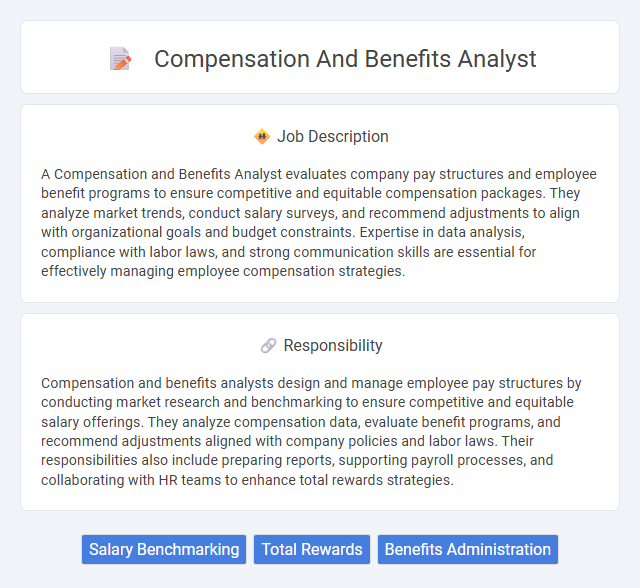
A Compensation and Benefits Analyst evaluates company pay structures and employee benefit programs to ensure competitive and equitable compensation packages. They analyze market trends, conduct salary surveys, and recommend adjustments to align with organizational goals and budget constraints. Expertise in data analysis, compliance with labor laws, and strong communication skills are essential for effectively managing employee compensation strategies.
Individuals with strong analytical skills and attention to detail are likely well-suited for a Compensation and Benefits Analyst position since the role involves evaluating pay structures and benefits programs to ensure competitiveness and compliance. Those who can manage confidential information and possess effective communication abilities may have a higher probability of success in collaborating with HR teams and explaining complex compensation data. People comfortable working with data and interested in labor market trends might find this job both suitable and fulfilling.
Qualification
A Compensation and Benefits Analyst typically requires a bachelor's degree in human resources, finance, or business administration, with certifications such as Certified Compensation Professional (CCP) enhancing career prospects. Proficiency in data analysis, compensation software, and knowledge of federal and state employment laws are essential qualifications. Strong analytical, communication, and problem-solving skills are critical for designing competitive pay structures and benefits programs.
Responsibility
Compensation and benefits analysts design and manage employee pay structures by conducting market research and benchmarking to ensure competitive and equitable salary offerings. They analyze compensation data, evaluate benefit programs, and recommend adjustments aligned with company policies and labor laws. Their responsibilities also include preparing reports, supporting payroll processes, and collaborating with HR teams to enhance total rewards strategies.
Benefit
A Compensation and Benefits Analyst likely evaluates and designs employee benefit programs to ensure competitiveness and compliance with regulations. They probably analyze data on health insurance, retirement plans, and other perks to recommend enhancements that attract and retain talent. Monitoring industry trends and employee preferences might also be essential aspects of their role in optimizing benefit offerings.
Challenge
A Compensation and Benefits Analyst likely faces challenges in accurately benchmarking salaries across diverse industries while ensuring compliance with evolving labor laws. The role may involve complex data analysis to design competitive packages that attract and retain top talent amidst budget constraints. Navigating the balance between employee satisfaction and company profitability could present ongoing difficulties in this field.
Career Advancement
Compensation and benefits analysts play a crucial role in designing and evaluating employee reward programs to attract and retain talent. Career advancement opportunities often lead to senior HR management or total rewards specialist positions, requiring expertise in market trend analysis and strategic compensation planning. Mastery of data analytics tools and certifications like Certified Compensation Professional (CCP) significantly enhance promotion prospects within the Human Resources field.
Key Terms
Salary Benchmarking
Compensation and benefits analysts specialize in salary benchmarking by researching industry pay standards and analyzing competitive compensation data to ensure equitable and market-aligned salary structures. They utilize compensation surveys, labor market trends, and internal salary data to recommend adjustments that attract and retain top talent while maintaining budget compliance. Expertise in statistical analysis and HR information systems enables precise benchmarking that supports strategic compensation planning and organizational competitiveness.
Total Rewards
Compensation and Benefits Analysts specializing in Total Rewards design, implement, and manage comprehensive packages that include salary, bonuses, health benefits, retirement plans, and wellness programs to attract and retain talent. They analyze market trends, conduct competitive benchmarking, and ensure compliance with legal regulations to optimize employee satisfaction and organizational performance. Their expertise supports strategic decision-making by balancing cost-efficiency with enhanced employee value propositions.
Benefits Administration
A Compensation and Benefits Analyst specializes in Benefits Administration by evaluating employee benefit programs, ensuring competitive and cost-effective offerings such as health insurance, retirement plans, and wellness initiatives. They analyze market trends and regulatory changes to optimize benefits packages that improve employee satisfaction and retention. Proficiency in benefits management systems and compliance with ERISA and ACA regulations is essential for effective administration and reporting.
 kuljobs.com
kuljobs.com